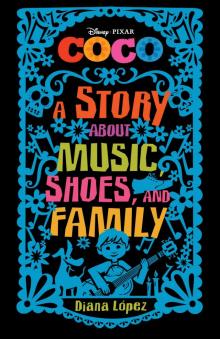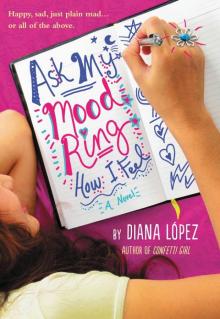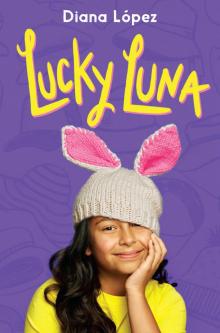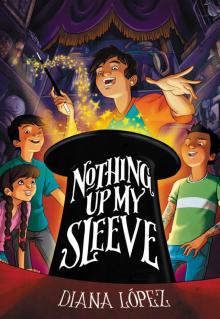- Home
- Diana Lopez
Choke Page 3
Choke Read online
Page 3
Mom crossed her arms, as if daring me to continue.
“Five, bland hospital food. Four, cranky patients. Three, the alcohol smell. Two, killer germs. And one, tired feet.”
“Ha, ha,” Mom said, throwing the towel at me. “Just for that, I’m going to insist you volunteer this summer.”
“Volunteer? You want me to work for free?”
“It’s a good way to figure out your interests.”
Elena jumped in, “That’s a great idea! Maybe I can volunteer, too.”
Honestly, sometimes I couldn’t understand why she was my best friend. Best friends aren’t supposed to sentence each other to a whole summer of work.
Just then, my father stepped in. He had a bunch of department store bags. “Hello, hello,” he said as he placed the bags on the coffee table. “Just a sec.” He went back outside and returned with even more bags.
“Alfonso,” Mom said, a bit worried. “What have you been up to?”
“I left work early and went shopping.”
Mom and I glanced at each other. Dad never went shopping.
“Let me show you what I got,” he said, all excited.
He took out a shoe box and showed us a pair of black patent leather dress shoes. Then he unwrapped three suits. Three! Black, navy blue, and dark gray. He reached into a J. C. Penney bag and took out five white dress shirts and five pairs of black socks. Finally, he showcased a bunch of new ties — yellow with a blue paisley print, gray with navy swirls, a flowery tie, a striped tie, and a solid maroon one. Elena oohed and aahed, but Mom and I were speechless.
“So what do you think?” Dad finally asked.
Mom scratched her head. “Well,” she tried, but couldn’t finish the sentence.
“I’m tired of wearing polo shirts and khakis all the time,” he explained. “I need to look more professional.”
Mom shrugged. She was as confused as I was.
“Watch the six o’clock news,” Dad said, “with the new weatherman.”
“The cute one with blond hair?” Elena asked.
“Yes. Him. He’s good-looking, right? And he wears a suit every day.”
“He has to wear a suit,” Mom said. “He’s on TV. But you’re on the radio. No one sees you, so it doesn’t matter what you wear.”
Dad frowned. For the past ten years, he’s been reporting the weather for a radio station — not the cool, pop station my friends listen to, but an AM station that makes local announcements like “mystery book club meets Tuesday at Westfall Library” or “please take your school supply donations to the yellow bus at Crossroads Mall.” But now he says he wants to point at the high and low pressure systems, explain the satellite pictures, and announce his forecasts on TV every night. So when a television job came up, he applied. He got through his initial interviews, all the way to an audition tape. Only two applicants got that far, so my dad’s chances were fifty-fifty. Unfortunately, he didn’t get the job, which really confused us because sometimes the guy who did get the job stumbled over his words — something my dad would never, ever do.
“You bought this stuff in case another job comes up, right?” I asked.
“Yes,” Dad admitted. “Remember last week, when the new guy predicted rain the same day I said that rain was unlikely? And my forecast was the right one?”
We nodded.
“You see? I do a better job of forecasting the weather. So why didn’t I get the job? Then I realized — I didn’t get the job because I don’t look the part. So next time there’s a position, I’ll be ready.”
“That’s ridiculous,” Mom said.
“It’s the only explanation,” Dad countered.
He was right. He had to be. All the popular girls wore headbands and plucked their eyebrows and used lipstick. They were “looking the part” just like the new weatherman.
“I don’t believe it,” Mom said.
“But it makes total sense,” I added. “Right, Elena?”
Elena’s face went blank. That girl could be so smart about numbers and science, but so dense about life.
“Why do you think we came home with tomato sauce all over our clothes?” I asked. “If we looked better, no one would pick on us.”
“I don’t know about you,” she said, “but I look just fine.”
“What’s this about tomato sauce?” Dad wanted to know.
“Long story,” I said, not wanting to explain again. “But since you’re changing your style, can I change mine, too?”
“Sure,” he said.
“So I can bleach my hair?”
“We’ve already discussed this,” Mom replied, “and the answer is still no.”
Dad nodded in agreement with Mom. “Besides, you have such lovely hair, mija.”
“No, I don’t. My hair looks like it’s been in a tornado. I can never get rid of the tangles and frizz no matter what kind of conditioner I use. I just know you named me Windy because of my wild hair.”
“No, I didn’t,” he said. “You were a pelón. Wasn’t she, Isabel?”
Mom nodded. “You were so bald. We had to Scotch tape bows on your head so people would know you were a girl.”
“Then why did you name me Windy?” I asked.
“Because we had gusts up to twenty-five miles per hour that day,” Dad said.
“You named me after the forecast?”
Elena laughed. “Just be glad it wasn’t humid or partly cloudy.”
I guess I had to agree with her. It would have been a double bummer to be called “humid” all the time. At least Windy sounds a lot like Wendy, a real name.
“So what would you name a cat that had beige fur and the biggest, bluest eyes in the world?” I asked.
“Raindrop,” Dad said.
Mom squinted at me, which meant she was suspicious. “Why are you asking about a cat?” She turned to Elena. “Why is my daughter asking about a cat?”
Elena gulped. She hated to lie, but she hated to get me in trouble, too.
“No reason,” I said. “It’s just a hypothetical question.”
“I hope so.” I could tell Mom wasn’t satisfied. “You better be asking about a hypothetical cat. Because the last thing we need is another veterinarian bill.”
“I know, Mom. You’ve told me a dozen times. No … more … cats.” Keeping Raindrop was going to be a lot tougher than I realized.
I didn’t think our conversation was over, but then Dad picked up his shopping bags, Mom collected the receipts, and Elena grabbed her phone to text her parents.
“Wait a minute! We’re not finished yet.”
Everyone stopped and looked at me.
“So can I bleach my hair?” I tried again.
Mom glanced at Dad. “Look what you started.”
He sighed. “Your mother’s right, mija. You can’t bleach your hair, but if you want to buy some new clothes, that’s okay. Just give me some time to save up. I went a little over my budget today.” He gave an embarrassed chuckle before heading to his room.
I felt glad about the chance to go shopping, but I also knew that I would need a lot more than a new outfit to make me part of the in-crowd.
My dad often says he can smell a storm about to break even on the clearest day. “It’s not a smell exactly,” he once explained. “But a tension. Like the clouds sucking in the air, trying to hold it in, but getting all blue in the face before letting go of their breath.”
I thought he was crazy till I felt that tension at school. Lots of people were holding their breath, getting ready to explode. The guys, for example. A lot of them liked Nina. She was new and pretty. She had no rep. She wore girly scarves but really rocked when it came to playing drums. The guys huddled at her locker, wanting to talk or carry her school supplies. She’d say, “That’s so sweet,” but she’d never stick around for a conversation or hand over her books. “I don’t want them to get ideas,” she once said. “Besides, I like high school boys. These kids are too young.” That made sense because she’d be in high school
if she hadn’t been held back a year. “Not because I couldn’t handle the work,” she’d told me, “but because of my absences. I get headaches sometimes. A lot of times.”
The in-crowd girls were holding their breath, too, since, with Nina around, the guys ignored them, even Courtney and Alicia, who’d been so popular. After Nina had challenged Courtney two weeks ago, the other in-crowd girls tried to be her friend, especially Liz. Maybe Courtney and Alicia had been mean to some of the in-crowd girls, too. Or maybe the in-crowd girls didn’t want to be on Nina’s bad side because she was quickly becoming the most popular girl in school. For some reason, though, Nina was more interested in hanging out with Elena and me — which made us hold our breath, because we knew she’d soon realize that being with us was a major social blunder.
In the meantime, we loved her attention. She constantly asked Elena about ice-skaters, and when she learned about Raindrop, she gave me a little blue collar for him. Plus, no one picked on us anymore. We were suddenly off-limits for the bullies and on-radar for Ronnie, who hovered nearby during lunch. Having him near made me feel prettier, even though my hair still frizzed and my glasses still fogged up every time I went outside. Because of Nina, I looked forward to going to school now, which made me feel smarter even though I hadn’t cleared an A. But most importantly, I felt cool. A real kind of cool, not the fake high-maintenance cool of the in-crowd, but coolicious.
Unfortunately, having an in-crowd-worthy friend like Nina couldn’t save me from speech class. Don’t get me wrong, I liked the class — everything except for the speech-making part. On the first day of school, Mrs. Campos had said that the number two thing people feared was death and the number one thing was public speaking. I believed her. I changed my list for The Top Five Butterfly-in-the-Stomach Experiences and put public speaking at number one, right next to dressing out for P.E. I just hated the whole experience, so when Mrs. Campos asked for volunteers, I raised my hand first.
“Are you crazy?” Elena whispered.
“Going first and getting it over with is my motto,” I explained.
“Mine’s waiting and hoping we run out of time.”
I was about to say her plan only made the misery last longer, but Mrs. Campos called on me.
“Okay, Windy,” she said. “You can go first.”
Our speeches required props. So I took my backpack to the front of the class and pulled out file folders, Post-its, a stapler, a calendar, pencils, pens, a sheet of white paper with a sketch of a keyboard (since my dad wouldn’t let me bring his laptop), a tape recorder, Kleenex, and a telephone.
Just then, Courtney and Alicia walked in. Courtney carried a large cosmetic bag and a small boom box while Alicia was wrapped in a beach towel bigger than a twin-size sheet.
“You girls are late,” Mrs. Campos said.
“We were getting ready,” they explained, heading to their desks.
As Alicia passed Nina, I secretly hoped Nina would step on the ridiculous towel and trip her, but she didn’t.
“Why don’t you go ahead and start your presentation now,” Mrs. Campos told me.
“Okay. I just have a few more things.” I took out a coffee mug and framed pictures of El Niño, Cloudy, and Sunny. I placed them on the table with the other items, but since it looked messy, I tried to straighten up. The whole arrangement felt wrong, so I reorganized. That’s when I realized that setting up a desk was truly complicated. Should the keyboard or the phone be easiest to reach? And should the file folders go on the left or right side? Where was the best place for the calendar? My hands shook and my foot frantically tapped the floor. I couldn’t steady myself, so my props kept falling over. I straightened a file folder, but then my shaky hand knocked over the picture frame.
Suddenly Mrs. Campos cleared her throat to get my attention. When I looked up, Courtney rolled her eyes, and the rest of the students looked like they wanted to laugh. I got so nervous. The food in my stomach somersaulted like clothes in a dryer. I couldn’t stop tapping my foot, and my sweaty palms could have ended a drought.
“Are you ready now?” Mrs. Campos asked.
“I just want to create a real desk environment, you know? I mean, um, not ‘you know’ but, well, um …”
Too many filler words! My score was sinking fast.
“Anyway,” I began, “I researched the duties of a receptionist.”
I held up the paper with my speech. I had a lot to talk about: the telephone, dictation, alphabetical order, scheduling. At home, my speech was exactly the minimum six minutes, but I must have talked really fast because my presentation was two minutes too short, which probably meant an additional ten points knocked off my score. Plus, I forgot to look at my audience. Oh, no! How many points would Mrs. Campos deduct for that? Hopefully I made a C. The school year was almost over, and I didn’t want to repeat speech in summer school.
“That’s it,” I said. “That’s all I have for my presentation.”
I looked at all the bored people in the classroom. And then, I saw Nina. She smiled really big and clapped. Elena joined in, then Ronnie. Before I knew it, almost everyone was clapping, and even though Courtney and Alicia crossed their arms and glared, I didn’t care. I’d never been applauded before. I knew my speech was crappy, but I felt like a celebrity.
After the applause, I restocked my backpack and returned to my desk. Courtney passed over a note with a sketch of a rabbit and “Way to go, Thumper” written underneath. I crumpled it. When I felt sure Mrs. Campos wasn’t looking, I hurled the wadded paper, and it hit Courtney’s “precious” face. Score one for me, I secretly cheered.
“I’ll go next,” Ronnie volunteered.
Mrs. Campos nodded, and the class waited as he organized some weight equipment. Then he started to unbutton his shirt.
“Ronnie,” Mrs. Campos said nervously, “what are you doing?”
“Don’t worry, Mrs. C,” he said. “I wore a tank top underneath. Since I’m going to talk about the right way to train, I have to show my biceps.”
“Ooh! Go ahead and show them,” Courtney said. “We don’t mind.”
“Yeah! Why don’t you show us how you train your abs, too?” Alicia added.
“Girls,” Mrs. Campos warned.
“I’m sorry,” Ronnie said. “I’m not trying to be improper or anything. I don’t want to offend anybody. But since I’m going to be a trainer, I have to use my biceps as props.”
“They can sure prop me up,” Courtney said.
I pulled out my TOP FIVE notebook to fix my “Reasons I Hate Courtney and Alicia” list. I scratched out “Dressing Like Dallas Cowboy Cheerleaders on Western Spirit Day” and wrote “Flirting with Ronnie” instead.
“That’s enough,” Mrs. Campos told Courtney. Then turning to Ronnie, she said, “Are you ready to begin?”
He nodded as he picked up one of the bars. “This is a barbell. See how straight it is?” He put it back down and picked up a different bar. “This one is called an easy curl bar. See how it’s, like, not straight?” Everyone nodded. “It’s got this W in the middle, which changes the angle of your grip and makes it easy — get it? — to do curls, which is a really good exercise for your biceps.”
First he showed us how to do preacher curls with the W-shaped bar. Then he showed us how to do standing barbell curls. And then he got the dumbbells and demonstrated concentration curls, hammer curls, and incline curls. This guy really knew how to work out his biceps. He kept pumping the weights, so his muscles got all firm and glistening. I tried, but I couldn’t stop my cheeks getting hot, my mouth getting dry, and my heart beating fast.
I didn’t want the whole world to know how I felt about Ronnie, so I forced myself to look away. But Nina caught my eye. She must have seen me blushing because she held up a note. “Do you like him?” it read.
First I shook my head to say no, but then I nodded to say yes. When she smiled, I knew I could trust her, but since I wanted my feelings to stay secret, I made the sign for zipped lips. Nina answ
ered with a thumbs-up.
A girl named Sonia went next. She spoke about pan de polvo, Mexican wedding cookies. They’re usually covered with cinnamon sugar and shaped like hearts. Sonia’s mom owns a bakery, and Sonia wants to expand the business by using different shapes like Christmas trees or pumpkins so people will order pan de polvo for other events, too. Lucky for us, she brought samples. They were delicious.
The next presentation was really dull. The boredom would have put me in a sleeper hold, but Nina clapped for it, too, which was a really nice thing to do.
Before the next person could volunteer, Nina raised her hand. “May I go to the restroom?” she asked.
Mrs. Campos nodded and handed her the hall pass.
When Nina opened the classroom door to leave, I saw Liz in the hallway and heard her say, “What took you so long?” Then Nina said, “Speeches.” Then the door shut.
How strange. Why were they going to the restroom together? This question kept me from concentrating on the next two speeches but not from clapping. I really liked the applause because it made everyone feel good. We should have started the tradition months ago.
Nina finally returned. I wasn’t timing her, not exactly, but she was gone for almost fifteen minutes. And maybe my eyes were playing tricks on me, but I felt positive her scarf had been knotted on the left side of her neck, not on the right as it was now. Maybe she took so long because she was trying different styles for her scarf. No matter how she wore it, she looked cool to me.
Finally, Alicia said, “I need to do my speech today, Mrs. Campos. This prom dress is on a strict eight-hour loan from my sister.”
“Okay, you can go next,” Mrs. Campos said.
Courtney took the boom box and a large cosmetic bag to the front of class while Alicia directed some students to push aside their desks to make a runway. Then she stood in front of class, staying wrapped in her towel. The only visible part of her outfit was the headband, light pink with some sparkly sequins.
“I’ll demonstrate in a minute,” she said. Whenever Alicia did a public speech, she punched out certain words. “First I want to give you some facts about modeling. It’s not as easy as it looks. Models risk their lives to look good. They starve themselves to keep skinny.” She nodded to Courtney who held up a poster about eating disorders. “Anorexia and bulimia are serious side effects of modeling. Did you know that in Spain there is now a minimum weight requirement for models?”

 Coco Middle Grade Novel
Coco Middle Grade Novel Ask My Mood Ring How I Feel
Ask My Mood Ring How I Feel Choke
Choke Confetti Girl
Confetti Girl Lucky Luna
Lucky Luna Nothing Up My Sleeve
Nothing Up My Sleeve